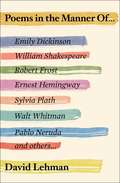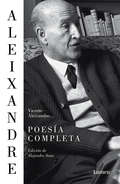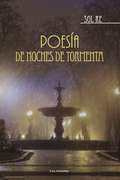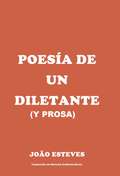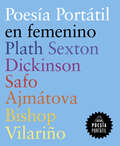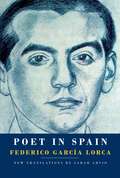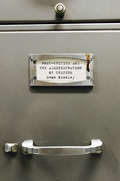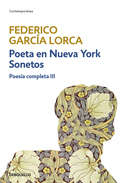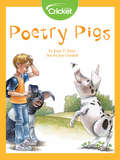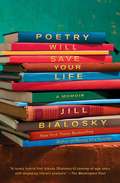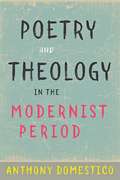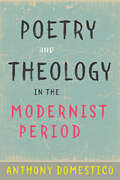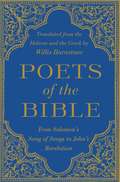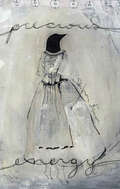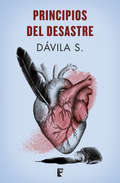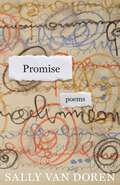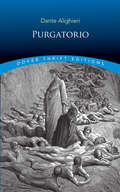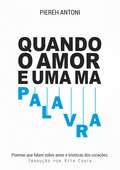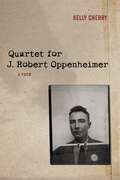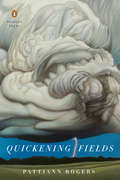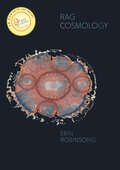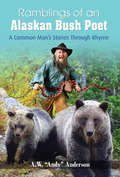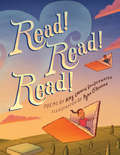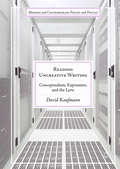- Table View
- List View
Poems in the Manner Of
by David LehmanPoems in the Manner Of is an illuminating journey through centuries of writers who continue to influence new work today, including that of respected poet and series editor of The Best American Poetry David Lehman.“Very few writers can actually shape how you see the world. David Lehman is such a writer,” says Robert Olen Butler. Now the Best American Poetry series editor and New School writing professor channels, translates, and imagines a collection of “poems in the manner of” Emily Dickinson, Robert Frost, Shakespeare, W.B. Yeats, Rilke, William Carlos Williams, and more. Lehman has been writing “poems in the manner of” for years, in homage to the poems and people that have left an impression, experimenting with styles and voices that have lingered in his mind. Finally, he has gathered these pieces, creating a striking book of poems that channels poets from Walt Whitman to Sylvia Plath and also calls upon jazz standards, Freudian questionnaires, and astrological profiles for inspiration. Intelligent and sparkling, this is a great gift for poetry fans and a useful resource for creative writers. These are poems of wit and humor but also deep emotion and clear intelligence, informed by Lehman’s genuine and knowledgeable love of poetry and literature. From Catullus and Lady Murasaki to Wordsworth, Neruda, Virginia Woolf, W.H. Auden, and Charles Bukowski, Poems in the Manner Of shows how much life there is in poets of the past. And like Edward Hirsch’s How to Read a Poem and Robert Pinsky’s Singing School, this book gives you more than poetry. Whether you’re reading for pure enjoyment or examining how a poet can use references and influences in their own work, Poems in the Manner Of is a treasure trove of literary pleasures and food for thought.
Poesía completa: Edición de Alejandro Sanz
by Vicente AleixandreCuando se cumplen cuarenta años de la concesión del Premio Nobel de Literatura a Vicente Aleixandre, publicamos una nueva edición de su poesía completa, al cuidado de Alejandro Sanz, máximo especialista en su obra. «Cuerpo feliz que fluye entre mis manos,rostro amado donde contemplo el mundo,donde graciosos pájaros se copian fugitivos,volando a la región donde nada se olvida.» Vicente Aleixandre es el poeta del amor, de la contemplación y del conocimiento. Su poesía es irreductible e incomparable y su lectura constituye una experiencia única, llena de iluminaciones. Alejandro Sanz nos ofrece en este libro la disposición definitiva del canon de Aleixandre, que queda completado con material inédito. Tenemos así la oportunidad de calibrar la verdadera dimensión de uno de los poetas más originales e influyentes del siglo XX hispánico, miembro de la generación del 27 y mentor de varias generaciones de poetas. Con este volumen, Aleixandre entre en el siglo XXI. Reseñas:«Fue el primer poeta que me llevó a escribir y por fin siento que voy a leerlo bien, completo. [...] Abre una puerta de mi cerebro que otros autores de su generación no han logrado abrir.»Luna Miguel, declaraciones a ABC «En los siete poemas inéditos hay ausencia, vacío, silencio... El hombre, excluido del amor, parece no existir, y no hay más realidad que la mentira. Así veía entonces Vicente Aleixandre el mundo, y así lo cantó, hasta dar forma al gran poemario del desamor. [...] Sus versos eran -lo son- un canto exaltado del amor y la juventud plena.»Inés Martín Rodrigo, ABC
Poesía de noches de tormenta
by Sol ReA veces lloramos tanto que provocamos tormentas. <P><P>Poesía de noches de tormenta es un poemario para las personas que piensan demasiado mientras pasan las noches en vela, con miedos, que no encajan en este mundo, que les ha hecho daño la vida y el amor, pero que nunca pierden la esperanza.
Poesía de un diletante (y prosa)
by joao batista esteves alves Marcela Gutiérrez Bravo y João EstevesLa poesía de João Esteves ya se declara diletante de entrada, en el título, pero llega a momentos que parecen desmentir tal adjetivo. Su prosa, fluída y casual, proporciona lo que, declaradamente, el autor pretende: entretenimiento literario.
Poesía portátil en femenino (Plath | Sexton | Dickinson | Pizarnik | Safo | Ajmátova | Bishop | Vilariño)
by Emily Dickinson Anne Sexton Sylvia PlathEl nuevo estuche de Poesía Portátil que recoge la selección de siete voces femeninas esenciales de la poesía. Esta recopilación abarca la urgencia lírica de siete poetas: los versos de la rusa Anna Ajmátova, sometida al terror más feroz durante el estalinismo, o la intensidad, el dolor y la belleza de las implacables composiciones de Sylvia Plath; pasando por los textos de Emily Dickinson, desprovistos de adornos y reglas que hablan de la mujer, de la enfermedad y de la muerte o una traducción inédita de algunos de los escasos textos que se conservan de la poeta griega Safo. Se recogen, además, los versos más icónicos de Elisabeth Bishop, Anne Sexton y la imponente Idea Vilariño, tres poetas clave en la poesía norteamericana y latinoamericana del siglo XX.
Poet in Spain
by Sarah Arvio Federico Garcia LorcaFor the first time in a quarter century, a major new volume of translations of the beloved poetry of Federico García Lorca, presented in a beautiful bilingual editionThe fluid and mesmeric lines of these new translations by the award-winning poet Sarah Arvio bring us closer than ever to the talismanic perfection of the great García Lorca. Poet in Spain invokes the "wild, innate, local surrealism" of the Spanish voice, in moonlit poems of love and death set among poplars, rivers, low hills, and high sierras. Arvio's ample and rhythmically rich offering includes, among other essential works, the folkloric yet modernist Gypsy Ballads, the plaintive flamenco Poem of the Cante Jondo, and the turbulent and beautiful Dark Love Sonnets—addressed to Lorca's homosexual lover—which Lorca was revising at the time of his brutal political murder by Fascist forces in the early days of the Spanish Civil War. Here, too, are several lyrics translated into English for the first time and the play Blood Wedding—also a great tragic poem. Arvio has created a fresh voice for Lorca in English, full of urgency, pathos, and lyricism—showing the poet's work has grown only more beautiful with the passage of time.
Poet-Critics and the Administration of Culture
by Evan KindleyAfter the 1929 crash, Anglo-American poet-critics grappled with the task of legitimizing literature for public funding and consumption. Modernism, Evan Kindley shows, created a new form of labor for writers to perform and gave them unprecedented say over the administration of culture, with consequences for poetry’s role in society still felt today.
Poeta en Nueva York | Sonetos (Poesía completa #3)
by Federico García LorcaPoeta en Nueva York | Sonetos es el tercer volumen de la Biblioteca Federico García Lorca y el tercero de los que compilan su «Poesía completa». En este libro, amén del impresionante poemario Poeta en Nueva York, se presentan las obras Tierra y luna, los Poemas sueltos II y III, Poemas en prosa, Diván de Tamarit, Sonetos, Seis poemas galegos y el Llanto por Ignacio Sánchez Mejías. Asimismo, se ofrecen las conferencias de Un poeta en Nueva York, Cómo canta una ciudad de noviembre a noviembre y el Ensayo o poema sobre el toro en España. La edición y los prólogos a cargo de Miguel García-Posada, permiten al lector acercarse a la complejidad de su obra y disfrutar, a lo largo de los siete volúmenes que componen esta Biblioteca Federico García Lorca, de uno de los autores españoles más relevantes del siglo XX. Luis Cernuda escribió...«Por esto te mataron, porque erasverdor en nuestra tierra áriday azul en nuestro oscuro aire.» --------------------------------------------------------------------------BIBLIOTECA FEDERICO GARCÍA LORCA Poesía competa:1. Libro de poemas | Primeras canciones | Canciones2. Romancero gitano | Poema del cante jondo3. Poeta en Nueva York | Sonetos Teatro completo:4. La zapatera prodigiosa | Mariana Pineda5. El público | Así que pasen cinco años6. Bodas de sangre | Yerma7. La casa de Bernarda Alba | Doña Rosita la soltera--------------------------------------------------------------------------
Poetry Pigs
by Joan T. ZeierHow could George write a poem? He wasn't a poet. But then George touches down in the Land of Hogs: Poetry Pig Farm! Pigs William Shakespeare and Emily Dickinson help George learn to become a poet.
Poetry Will Save Your Life: A Memoir
by Jill BialoskyAn unconventional and inventive coming-of-age memoir organized around forty-three remarkable poems by poets such as Robert Frost, Emily Dickinson, Wallace Stevens and Sylvia Plath, from a critically acclaimed New York Times bestselling author and poet.For Jill Bialosky, certain poems stand out like signposts at pivotal moments in a life: the death of a father, adolescence, first love, leaving home, the suicide of a sister, marriage, the birth of a child, the day in New York City the Twin Towers fell. As Bialosky narrates these moments, she illuminates the ways in which particular poems offered insight, compassion, and connection, and shows how poetry can be a blueprint for living. In Poetry Will Save Your Life, Bialosky recalls when she encountered each formative poem, and how its importance and meaning evolved over time, allowing new insights and perceptions to emerge. While Bialosky’s personal stories animate each poem, they touch on many universal experiences, from the awkwardness of girlhood, to crises of faith and identity, from braving a new life in a foreign city to enduring the loss of a loved one, from becoming a parent to growing creatively as a poet and artist. In Poetry Will Save Your Life, Bialosky has crafted an engaging and entirely original examination of a life while celebrating the enduring value of poetry, not as a purely cerebral activity, but as a means of conveying personal experience and as a source of comfort and intimacy. In doing so she brilliantly illustrates the ways in which poetry can be an integral part of life itself and can, in fact, save your life.
Poetry and Theology in the Modernist Period
by Anthony DomesticoIn this book, Domestico reveals how an important strand of modern poetry actually understood itself in and through the central theological questions of the modernist era: What is transcendence, and how can we think and write about it? What is the sacramental act, and how does its wedding of the immanent and the transcendent inform the poetic act? How can we relate kairos (holy time) to chronos (clock time)? Seeking answers to these complex questions, Domestico examines both modernist institutions (the Criterion) and specific works of modern poetry (Eliot’s Four Quartets and Jones’s The Anathemata). The book also traces the contours of what it dubs "theological modernism": a body of poetry that is both theological and modernist. In doing so, this book offers a new literary history of the modernist period, one that attends both to the material circulation of texts and to the broader intellectual currents of the time.
Poetry and Theology in the Modernist Period
by Anthony DomesticoWhat if the religious themes and allusions in modernist poetry are not just metaphors?Following the religious turn in other disciplines, literary critics have emphasized how modernists like Woolf and Joyce were haunted by Christianity’s cultural traces despite their own lack of belief. In Poetry and Theology in the Modernist Period, Anthony Domestico takes a different tack, arguing that modern poets such as T. S. Eliot, W. H. Auden, and David Jones were interested not just in the aesthetic or social implications of religious experience but also in the philosophically rigorous, dogmatic vision put forward by contemporary theology. These poets took seriously the truth claims of Christian theology: for them, religion involved intellectual and emotional assent, doctrinal articulation, and ritual practice. Domestico reveals how an important strand of modern poetry actually understood itself in and through the central theological questions of the modernist era: What is transcendence, and how can we think and write about it? What is the sacramental act, and how does its wedding of the immanent and the transcendent inform the poetic act? How can we relate kairos (holy time) to chronos (clock time)? Seeking answers to these complex questions, Domestico examines both modernist institutions (the Criterion) and specific works of modern poetry (Eliot’s Four Quartets and Jones’s The Anathemata). The book also traces the contours of what it dubs "theological modernism": a body of poetry that is both theological and modernist. In doing so, this book offers a new literary history of the modernist period, one that attends both to the material circulation of texts and to the broader intellectual currents of the time.
Poetry, Modernism, and an Imperfect World
by Sean PryorDiverse modernist poems, far from advertising a capacity to prefigure utopia or save society, understand themselves to be complicit in the unhappiness and injustice of an imperfect or fallen world. Combining analysis of technical devices and aesthetic values with broader accounts of contemporary critical debates, social contexts, and political history, this book offers a formalist argument about how these poems understand themselves and their situation, and a historicist argument about the meanings of their forms. The poetry of the canonical modernists T. S. Eliot, Mina Loy, and Wallace Stevens is placed alongside the poetry of Ford Madox Ford, better known for his novels and his criticism, and the poetry of Joseph Macleod, whose work has been largely forgotten. Focusing on the years from 1914 to 1930, the book offers a new account of a crucial moment in the history of British and American modernism.
Poets of the Bible: From Solomon's Song of Songs to John's Revelation
by Willis Barnstone“The vividness and beauty of the language emerge in a fresh way . . . with evocative simplicity.” —Robert Alter, professor emeritus of Hebrew and comparative literature, University of California, Berkeley The world’s greatest poetry resides in the Bible, yet these major poets are traditionally rendered into prose. In this pioneering volume of biblical poets translated in English, Willis Barnstone restores the lyricism and power of the poets’ voices in both the New and Old Testaments. In the Hebrew Bible we hear Solomon rhapsodize in Song of Songs, David chant in Psalms, God and Job debate in grand rhetoric, and prophet poet Isaiah plead for peace. Jesus speaks in wisdom verse in the Gospel, Paul is a philosopher of love, and John of Patmos roars majestically in Revelation, the Bible’s epic poem. This groundbreaking volume includes every major biblical poem from Genesis and Adam and Eve in the Garden to the last pages of Alpha and Omega in Paradise.
Precious Energy
by Shannon BramerPrecious Energy, the fourth collection of poetry from Hamilton-born poet and playwright Shannon Bramer, is a uniquely playful collection of vibrantly sad, peculiar, and often funny poems about domestic life, motherhood, and the baffled child that remains within us all even as we grow up and into whatever person we keep trying to become. Featuring a coterie of subjects, from fish sticks and LEGO pieces to mothers too tired to have sex and solitary swans in everyone's basement, these poems dexterously navigate a landscape of domestic isolation, insecure attachments, and confused personal boundaries with honesty and unexpected humour.
Principios del desastre
by Dávila S.Principios del desastre es el primer libro de poemas de Dávila S. Luces y sombras Tus ojos son esos orbesverdes que parpadeanen medio de la noche,deslumbrando las acerasy los cielos,mostrando ese suspirode luz que te define. ¿Podrá mi oscuridadluchar contra el vacíode tenerte sin tenerte,sin ser mío el tiemposuficiente, en estos ojostuyos que hoy me entienden? Tus labios parecensaber todas las respuestas.
Promise: Poems
by Sally Van DorenSally Van Doren’s Promise features a series of short lyric poems, contemplative vignettes of daily life that examine friendship, marriage, and family with a veneer of playfulness. These poems take us into a space where a year is compressed into minutes and a small trickle of memory floods the mind. Van Doren, a visual artist as well as a poet, composes word collages that help us to touch the promise underneath the surface and to make sense of the senseless.
Purgatorio (Dover Thrift Editions: Poetry Ser.)
by Dante Alighieri Henry Wadsworth LongfellowThe second book in the three-part Divine Comedy finds Dante and his guide, Virgil, halfway between Heaven and Hell. Having portrayed the tortures of the damned in Inferno, Dante resumes his allegory of the soul's journey to God with Purgatorio. A place of pain but also hope, Purgatory allows its suffering souls to reflect upon their sins and to work toward their moral improvement, paving the way for their eventual entry to Paradiso.Dante transformed the traditional notion of Purgatory by depicting how aspiring souls could undergo moral change, exchanging their human frailty for divine perfection. His exploration of theological issues, especially the role of free will, offers an eloquent and inspiring parable of human possibility and redemption. This edition features the renowned translation by American poet Henry Wadsworth Longfellow and serves as a companion volume to the Dover editions of Inferno and Paradiso.
Quando o Amor é uma má palavra
by Piereh Antoni Rita Isabel Ribeiro da Costa> - Rita Costa << "Quando o amor é uma má palavra" é uma antologia poética que reune setenta e cinco expressões de sentimento escritas por mim desde o ínicio do ano de 2008. Em "Quando o Amor é uma má palavra" personifiquei diversas situações, reais ou imaginárias. Minha única intenção é que o leitor seja transportado para um mundo de muitas histórias, no qual terá toda a liberdade para interpretá-las. As palavras incluídas em cada uma desta "folhas" não pretendem discriminar. Estão ordenadas da mesma forma que o amor, com picos e abismos, quando começa, quando se cruza com a desilusão e dor, quando termina com o desejo de renascer e tentar uma vez mais. Então, o melhor é deixar que elas mesmas se apresentem com a sua histórias.>> - Piereh Antoni
Quartet for J. Robert Oppenheimer: A Poem
by Kelly Cherry“Robert Oppenheimer was a complex human being. No biography yet written comes even close to this elegant skein of poems in capturing his life and character.”—Richard Rhodes, author of the Pulitzer Prize–winning The Making of the Atomic Bomb Quartet for J. Robert Oppenheimer records in poetry the life and times of one of America’s best-known scientists, the father of the atomic bomb who later lobbied for containment of nuclear weaponry. In brief, elegant stanzas, Kelly Cherry examines Oppenheimer’s inspirations, dreams, and values, visiting the events, places, and people that inspired him or led him to despair. She finds his place among scientists of his own time, such as Alan Turing and Albert Einstein, as well as his connections with historical and mythological figures from John Donne to Persephone. “Of course he had blood on his hands. Who did not?” says Cherry, in “The Nature of War.” Again and again in the course of this remarkable poem, Cherry’s narration of Oppenheimer’s life compels her readers to contemplate the vagaries of science, guilt, and our responsibilities to each other. “Quartet for J. Robert Oppenheimer is a book length poem in which the architect of the atom bomb comes to embody America and the West’s Faustian control of nature and the paradoxical helplessness and guilt which that control entailed. Oppenheim is marvelous, complicated, flawed and admirable character, and these poems read like chapters in a novel without in any way abandoning the intensities of feeling and image or delight in language we associate with lyric poetry. A terrific achievement and a compelling read.”—Alan Shapiro, author of Life Pig and Reel to Reel
Quickening Fields
by Pattiann RogersA new collection by an award-winning poet who “presents her apprehensions of the natural world with striking accuracy and emotional impact” (Orion Magazine)Denise Levertov has called Pattiann Rogers a “visionary of reality, perceiving the material world with such intensity of response that impulse, intention, meaning, interconnections beyond the skin of appearance are revealed.” Quickening Fields gathers fifty-three poems that focus on the wide variety of life forms present on earth and their unceasing zeal to exist, their constant “push against the beyond” and the human experience among these lives. Whether a glassy filament of flying insect, a spiny spider crab, a swath of switch grass, barking short-eared owls, screeching coyotes, or racing rat-tailed sperm, all are testifying to their complete devotion to being. Many of the poems also address celestial phenomena, the vision of the earth immersed in a dynamic cosmic milieu and the effects of this vision on the human spirit. While primarily lyrical and celebratory in tone, these poems acknowledge, as well, the terror, suffering, and unpredictability of the human condition.
Rag Cosmology
by Erin RobinsongWinner of the 2017 A.M. Klein Prize for Poetry BookThug is proud to introduce a groundbreaking debut collection of poems by Erin Robinsong. In this time of ecological precarity, Rag Cosmology is an urgent invitation to reinvent our modes engagement with the environment we not only inhabit, but are. Refusing the lamentation that leaves us as resigned witnesses to devastation, Rag Cosmology counters fatalist narratives with the pleasures of ecological entanglement and engagement. Tracing relationships between seemingly irreconcilable things--economy and ecology, weather and lust, bills and inner voices, wages of avoidance and wages of listening--Rag Cosmology offers the intimate and lush language of thought that yearns for an imaginative reinvention of how we understand what we are part of and what we are losing.
Ramblings of Alaskan Bush Poet: A Common Man's Stories Through Rhyme
by Andy AndersonI've held a myriad of jobs in the more than 53 years I've made Alaska, the Great Land, my home. Varieties of employment, along with my other life experiences, have given me an interesting and exciting existence. My experiences have been educational, some frightening, some life threatening, some humorous, some heartbreaking, but all played a part in preparing me for the writing of Ramblings of an Alaskan Bush Poet. I'm hopeful my backstories will put the reader in somewhat the same mind set, or emotion, I was experiencing at the time. When readers discuss my work I hope to be viewed as a common man who tells his stories through rhyme and, at the same time, someone who paints a vivid picture of what my limericks convey.
Read! Read! Read!: Journey To The West (Penguin Active Reading (graded Readers) Series)
by Amy Ludwig VanderwaterTwenty-three poems capture the joys of reading. From that thrilling moment when a child first learns to decipher words, to the excitement that follows in reading everything from road signs to field guides to internet articles to stories, these poems celebrate reading. They also explore what reading does -- how it opens minds, can make you kind, and allows you to explore the whole world. Ryan O’Rourke’s rich artwork beautifully captures the imagination and playfulness in these poems by noted author Amy Ludwig VanDerwater.
Reading Uncreative Writing
by David KaufmannThis book examines Uncreative Writing--the catch-all term to describe Neo-Conceptualism, Flarf and related avant-garde movements in contemporary North American poetry--against a decade of controversy. David Kaufman analyzes texts by Kenneth Goldsmith, Vanessa Place, Robert Fitterman, Ara Shirinyan, Craig Dworkin, Dan Farrell and Katie Degentesh to demonstrate that Uncreative Writing is not a revolutionary break from lyric tradition as its proponents claim. Nor is it a racist, reactionary capitulation to neo-liberalism as its detractors argue. Rather, this monograph shows that Uncreative Writing's real innovations and weaknesses become clearest when read in the context of the very lyric that it claims to have left behind.
